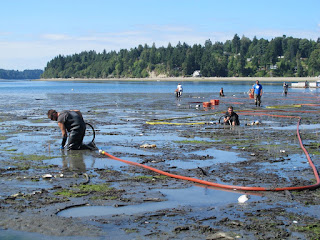Packin' Up, Movin' Out
Goodbye Honey Bucket
Will this really be missed?
(and did this mess get to where it was going?)
What could possibly go wrong?
According to recent press releases, geoduck farmers are "freaking out" over the recent 25% tariff imposed on geoduck grown in Puget Sound. The Chinese, in one action, may have done more to preserve and possibly restore Puget Sound's intertidal area than a decade of efforts from people concerned over the transformation brought on by PVC at planting and liquification of sediments at harvesting. While unknown whether it will last, what is becoming clear is some companies seem to be standing on thin legs and are at risk of failure.
Money for Nothin'
Kicks for Free
At the Expense of Puget Sound's
Intertidal Habitat
(and your leased tidelands)
"You'll get rich. And, if not, well, they're your tidelands, not mine."
A recent opinion piece in the Seattle Time by Jim Gibbons, founder of Seattle Shellfish, stated prices have dropped 40% due to the tariff imposed. Worried about whether his business will be able to survive, he wrote he will be curtailing "growth" and cutting back on planting. Whether the cutting back and curtailments will occur on leased tidelands, whose owners were told of great wealth to come for doing nothing from these leases, or on tidelands privately held by Seattle Shellfish, was not made clear. What was made clear is that the founder of Seattle Shellfish is concerned about a breach in the moat which had surrounded this industry's model.
In the end,
aren't we all brothers?
Panopea japonica, Panopea generosa
"both nuclear genes
revealed low genetic divergence
between P. generosa and
P. japonica"
In the piece penned by Mr Gibbons, he noted Puget Sound is not the only place the Chinese are able to source geoduck. He notes Mexico, Canada and North Korea as alternatives (not mentioned was New Zealand). In a 2015 study on genetic differences between "geoduck" from different geographic areas, the point was made that there was a "low genetic divergence" between geoduck from the northwest and Asia. So why would someone pay exorbitant prices for something grown in the US when close to the same thing, if not the same thing, is able to be grown and harvested in Asian waters? They won't. And for that reason, Mr. Gibbons, Bill Dewey with Taylor Shellfish, and a myriad of small operators, rightly worry that in fact, a moat has been breached and things have changed.







